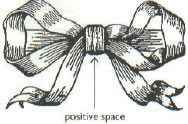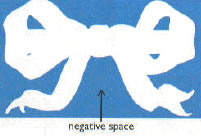Elements of Art
The common language of artists
Elements of Art
Space
The area all around you is called space. You just read about shapes and forms; they depend on the space around them. Relationships are formed between shapes and forms, and spaces.
 Think of your body and all the objects around you as positive space. These are solid, or concrete things.The bow in this picture is positive space. Positive space is the space an object occupies, as opposed to the background or space around it.
Think of your body and all the objects around you as positive space. These are solid, or concrete things.The bow in this picture is positive space. Positive space is the space an object occupies, as opposed to the background or space around it.
In this picture, notice only the colored, shaded area all around and within the loops of the bow. The colored area is the negative space. It is the space surrounding an object. It is often called the background.
loops of the bow. The colored area is the negative space. It is the space surrounding an object. It is often called the background.
Your brain is split into two halves called the left and right hemispheres. The left hemisphere rules the right side of your body and the right hemisphere rules the left. (That is why a blood clot in the right side of the brain affects the left side of the body in stroke victims.) The following diagram shows some functions of the left and right hemispheres. There are many other functions that utilize both sides of the brain—cooking, driving, thinking, experimenting, inventing, and studying—to name only a few.

 Think of your body and all the objects around you as positive space. These are solid, or concrete things.The bow in this picture is positive space. Positive space is the space an object occupies, as opposed to the background or space around it.
Think of your body and all the objects around you as positive space. These are solid, or concrete things.The bow in this picture is positive space. Positive space is the space an object occupies, as opposed to the background or space around it.In this picture, notice only the colored, shaded area all around and within the
 loops of the bow. The colored area is the negative space. It is the space surrounding an object. It is often called the background.
loops of the bow. The colored area is the negative space. It is the space surrounding an object. It is often called the background.Your brain is split into two halves called the left and right hemispheres. The left hemisphere rules the right side of your body and the right hemisphere rules the left. (That is why a blood clot in the right side of the brain affects the left side of the body in stroke victims.) The following diagram shows some functions of the left and right hemispheres. There are many other functions that utilize both sides of the brain—cooking, driving, thinking, experimenting, inventing, and studying—to name only a few.

When you perceive empty space and have trouble recognizing it as a shape, the brain switches the problem over to the right hemisphere. The right hemisphere seems to be more flexible and interested in any unknown situation.
In this exercise you should become aware of and use the right hemisphere of the brain as well as the often dominant left side. This exercise trains you to look for negative spaces as shapes in themselves.

All the white space around the chair is negative space. The chair itself is positive space.Mentally trace the location of the negative spaces - the colored areas represent negative space.
If you approach a drawing by establishing only the negative area, the positive area will tend to jump out at you after you are finished. You may find you are able to obtain better results in your drawing because you are not focused on outlining the positive shapes first. You will have given both sides of your brain a chance to record shapes and space.
In this exercise you should become aware of and use the right hemisphere of the brain as well as the often dominant left side. This exercise trains you to look for negative spaces as shapes in themselves.

All the white space around the chair is negative space. The chair itself is positive space.Mentally trace the location of the negative spaces - the colored areas represent negative space.
If you approach a drawing by establishing only the negative area, the positive area will tend to jump out at you after you are finished. You may find you are able to obtain better results in your drawing because you are not focused on outlining the positive shapes first. You will have given both sides of your brain a chance to record shapes and space.